Nestled in the Southern Command Cantonment, the Southern Command Museum is one of the finest museums you should visit. The museum primarily focuses on the history, performances and achievements of the Southern Command Wing of the Indian Army.
We decided to tour this museum on our visit to Pune in the January of 2020. This was two months before the COVID-19 lockdown brought the world to a standstill. The Southern Command Army Museum is a treasure trove for those who want to know more about the Indian Army, particularly the Southern Command.
As you explore the property you come across various tanks, vehicles, ammunitions, guns, uniforms and much more. Overall the museum comprises four large galleries that include paintings and rare photographs.
On the property, you will also find a corridor with important regiment flags, an ammunition gallery and a paintball gun area where you can try your shooting skills.
Did You Know?
The Southern Command Museum is the only museum in South Asia erected entirely by citizen contribution.
If you haven’t already been to Southern Command Museum Pune read more below and enjoy the photo tour of the property. However, before that, we focus on relevant information for those who intend or plan to visit this Indian Army Museum.
Southern Command Museum Pune Location
The museum is located in the Pune Cantonment area. It is situated inside the premises of the National War Memorial.
Address: Prince of Wales Drive, Ghorpuri Lines, Dobarwadi, Ghorpadi, Pune, Maharashtra 411001
Southern Command Museum Pune Timings
Morning Hours: 9:30 to 12:30 / Evening Hours: 16:00 to 19:00
Southern Command Museum Pune Ticket Price
The ticket price for entry is Rs. 20 per person.
NOTE: Kindly carry your Aadhaar Card or any photo identity card required for verification at the gate.
What is Southern Command?
Southern Command is a formation of the Indian Army active since 1895.
During the British rule in India, the East India Company had three presidency armies. They were named after the three presidencies: the Bengal Army, the Madras Army and the Bombay Army.
However, these armies were abolished with effect from April 1, 1895. On the same day, the Indian Army came into existence. Furthermore, the Indian Army is now split into four Commands: Bengal Command, Bombay Command, Madras Command and Punjab Command.
In 1908, the four Commands merged into two Armies: the Northern Army and the Southern Army.
By 1920, the two armies split into four commands: Northern Command, Western Command, Eastern Command and Southern Command.
In April 1942, the Southern Command reformed as the Southern Army. However, it was reverted to the title Southern Command in November 1945. Today, the Southern Command holds nine states and four Union Territories which cover 40% of India.
About Southern Command Museum
While the National War Memorial was open to the public on August 15 1998, the Southern Command Museum was ready in 2013.
It is dedicated to soldiers, sailors and airmen who laid down their lives since Independence to defend the country.
The idea behind the establishment of this army museum is to focus on the history and achievements of the Southern Command Wing of the Indian Army.
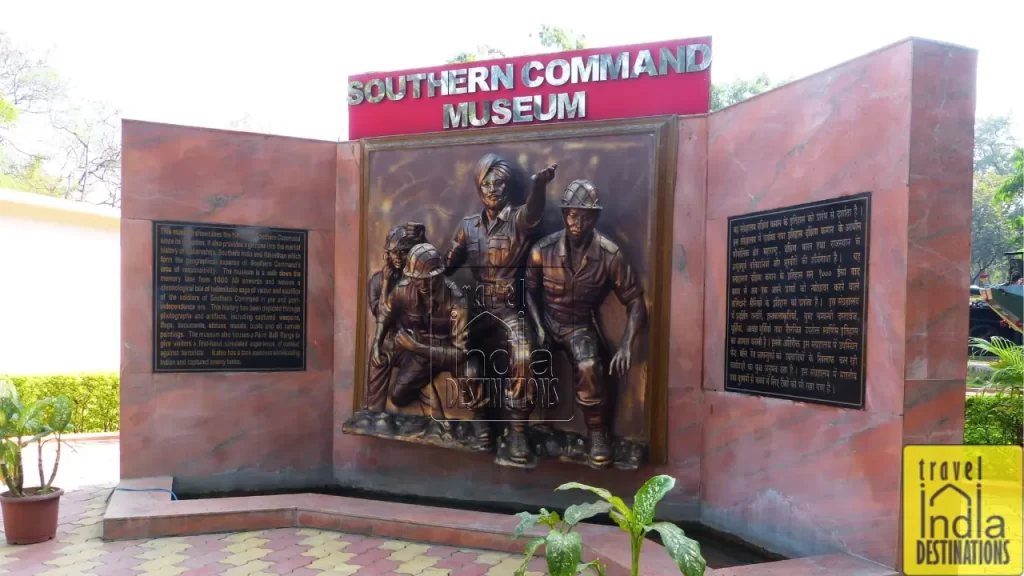
It also becomes a medium to showcase the equipment, uniforms, ammunition, tanks, vehicles and guns used by the Southern Command.
The museum also sheds light on the battles fought by the Southern Command and the leading generals and outstanding performers in the army. This military museum focuses mainly on the Indo-China War of 1962 and the Indo-Pakistan War of 1965 and 1971.
The museum is further divided into four main galleries:
- The Artillery Section
- Southern Command Museum Hall
- Munitions Gallery
- Paint Ball Gun Range
Tour of Southern Command Museum in Pune
1. The Artillery Section
The moment you walk into the Southern Command Museum premises you come up at the Artillery section. This section of the museum is outdoors and you can see various tanks lined up for the visitors.
Some of the vehicles and tanks are used in the Indo-Pakistan War of 1965 and 1971. On the other hand, visitors can also see captured enemy tanks on display here. However, please note that visitors are not allowed to touch or climb on these tanks for selfies and pictures.
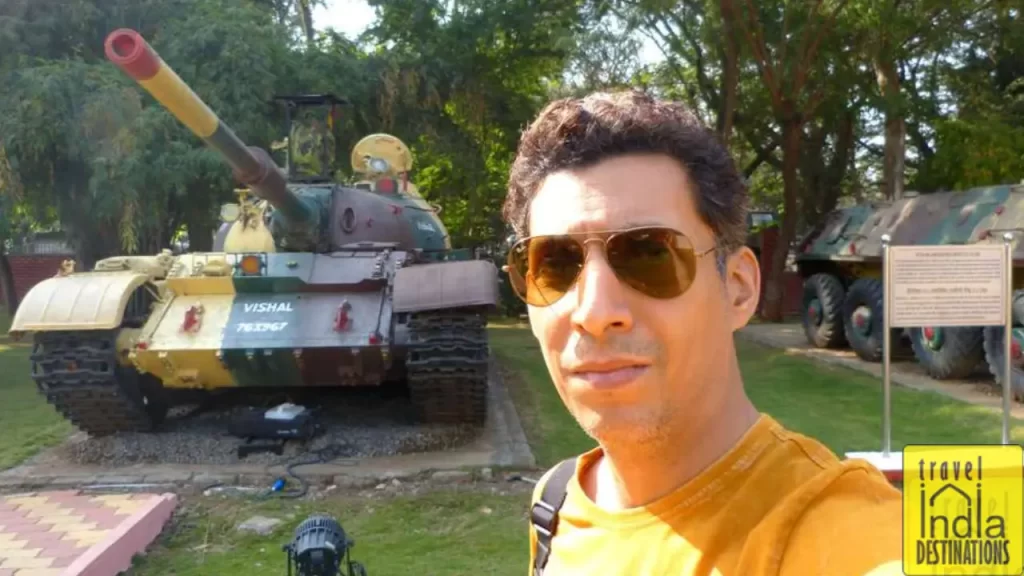
The T-55 tank behind me is of Soviet origin. This tank was used in the Battle of Chachro during the Indo–Pak War of 1971. It eventually became the most-produced tank in military history.
The tank weighs 36,000 kilograms and is known for its manoeuvrability, high velocity and low silhouette. It also has an exceptional capability of cruising long-range with high speeds of 48 kmph.
The Battle of Chachro a.k.a. The Chachro Raid of 1971 is probably the most daring surgical strike by India in Pakistan. During the raid, the Indian Army’s 10 Para Commandos infiltrated 80 kilometres inside the enemy territory without any casualties.
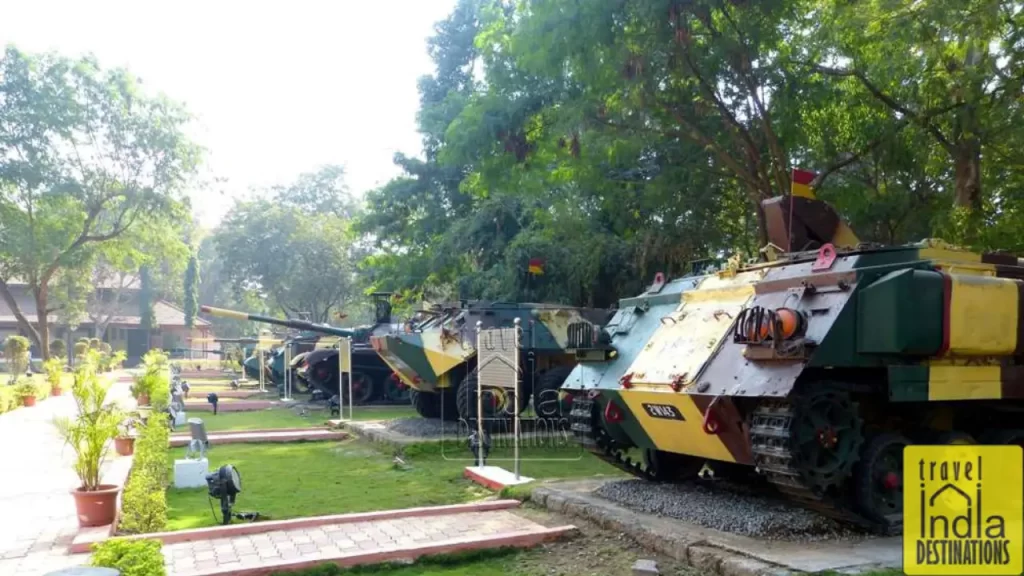
While you are exploring the Southern Command Museum you can see the Vijayanta tank here. The word Vijayanta means Victorious and it is the main battle tank of the Indian Army.
This Made in India tank is a prototype of a licensed design of the Vickers Mk 1. It was first designed in 1963 and entered the service in 1965. Most of these tanks are from the Indo–Pak War of 1971, Operation Blue Star and the 2019 India-Pakistan standoff.
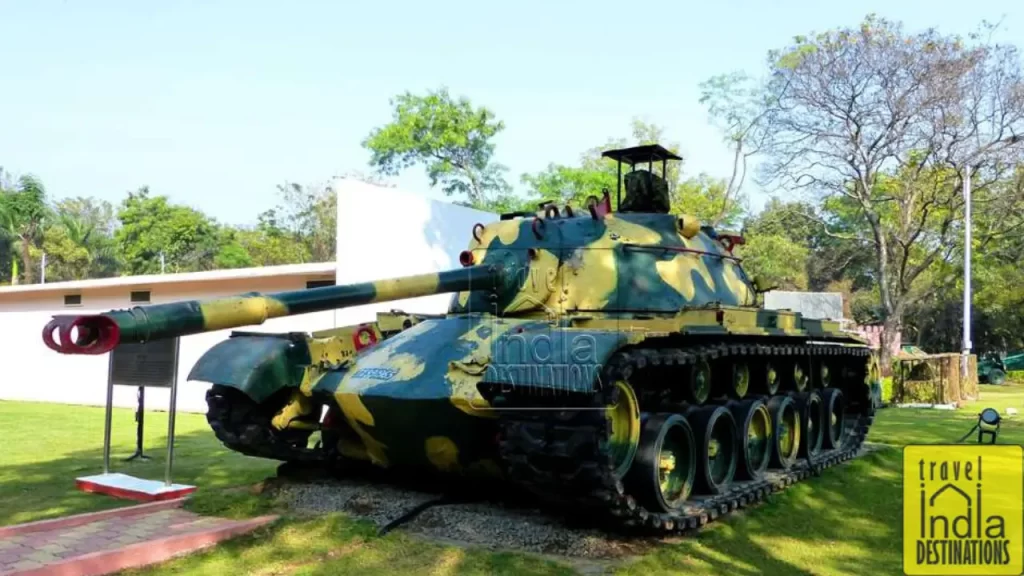
As you stroll through the lineup of tanks you also come across the captured M48 Patton Tank here. This tank was used by Pakistan against India in the Indo-Pak War of 1971. Now you can witness it in person at Pune’s National War Museum.
The M48 Patton was the first U.S. medium gun tank that required a four-man crew. This tank was widely exported by the United States to countries like Turkey, Taiwan and Greece.
2. Southern Command Museum Hall
The sooner you move past the artillery section, you come across the army museum building. This building consists of a museum hall, a souvenir shop and a toilet area.
As you walk past the long stretch of this building you will come across a corridor that has all the important flags of the Indian Army. The board below the flag provides more information about the flag and its respective regiment. This provides you with a deep insight into various regiments and brigades that fall under the Southern Command.
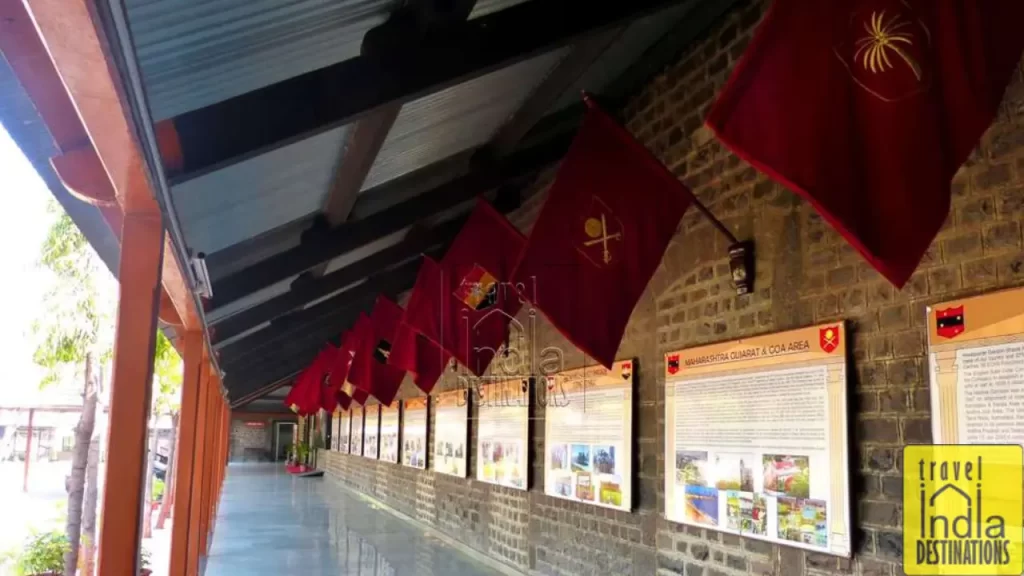
The Southern Command museum hall instantly captures your attention you see mannequins adorning various uniforms of the Army, Navy and the Air Force.
Here you can explore various machine guns, lightweight machine guns and weapons used by the Southern Command in various battles and wars.
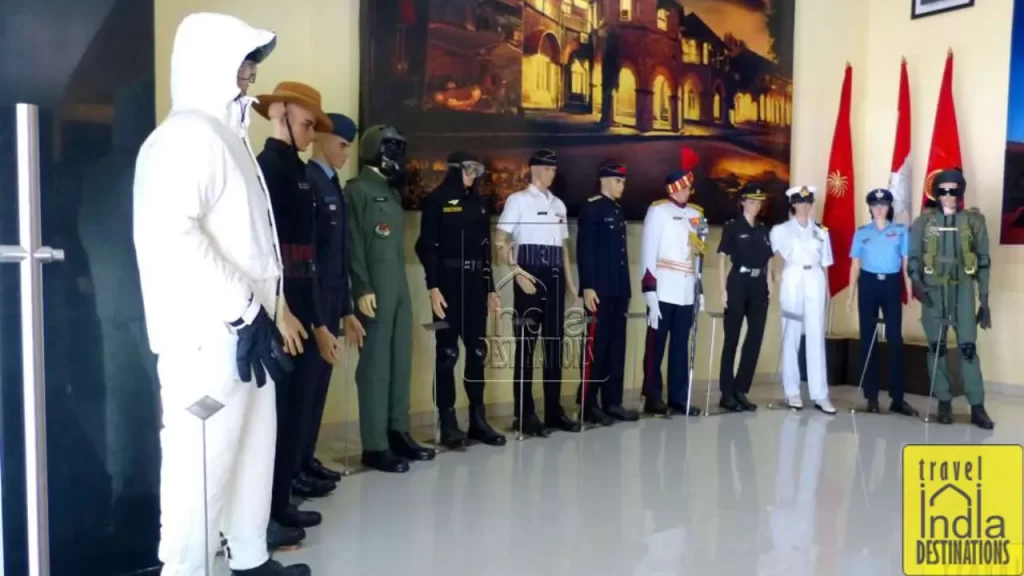
You can also see the busts of various outstanding performers and generals who have led their brigade from the front. The walls have picture frames of real images of battle scenes that demand undivided attention.
A huge bronze-coloured floor-to-ceiling 3D image of the Indian Army in action is one of the highlights of the museum hall. Standing right before this giant 3D image is an experience hard to describe in words.
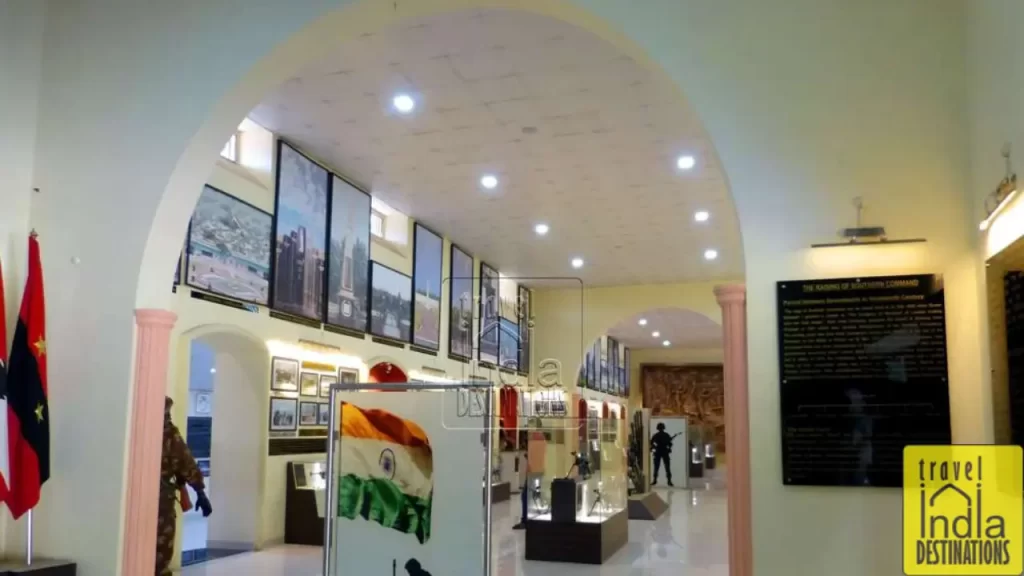
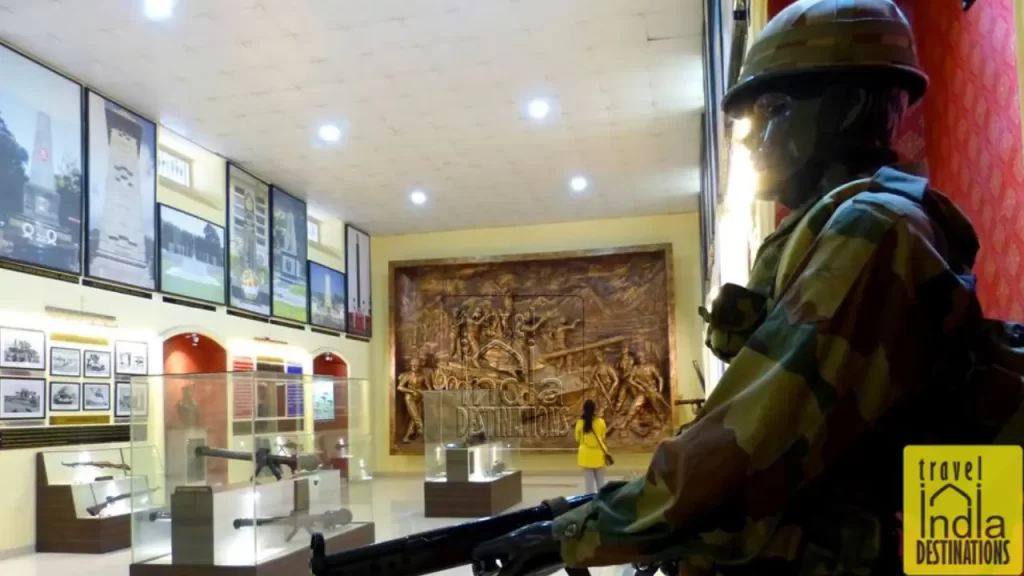
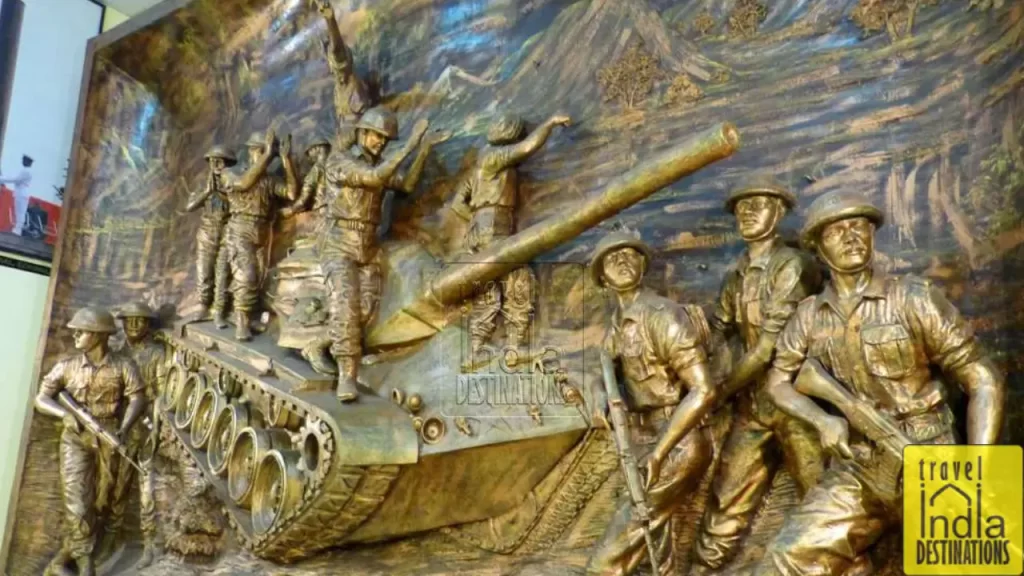
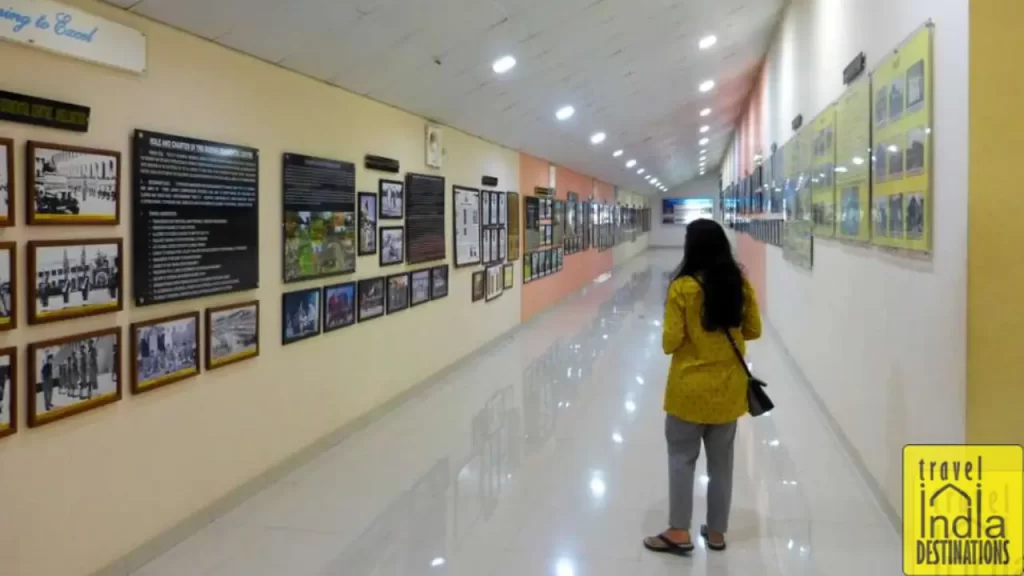
The museum hall also has an exclusive photo gallery within it. This long area of the museum hall sports pictures of the Southern Command’s participation in controlling riots, and assistance during floods and other national calamities.
When you are through with the museum hall, you can explore the Souvenir Shop. This tiny shop allows you to shop for various items that you can take back home. The shop has mugs, decoration plates, t-shirts, caps, hats, key chains, clocks, diaries, fridge magnets and more.
Right next to the Souvenir Shop is a tiny cafeteria where you can have sandwiches and tea/coffee. You can also use the restroom to freshen up before you move to the Munition Gallery.
3. Munition Gallery
Nestled within the premises of the National War Memorial is the Munition Gallery. This small open gallery highlights the projectile cartridges, fuzes and primers used in multiple battles and wars.
Right near the entrance, you can see two large 105 mm IFC projectiles. On the left side, various primers and fuzes are on display. These primers and fuzes were used in various howitzers and mortars. A military personnel will guide you through the gallery explaining how primers and fuzes work and their usability.
For us, it was a great learning experience. The gallery also sports mortar ammunition and miniature replicas of various missiles and large-sized combat weapons.
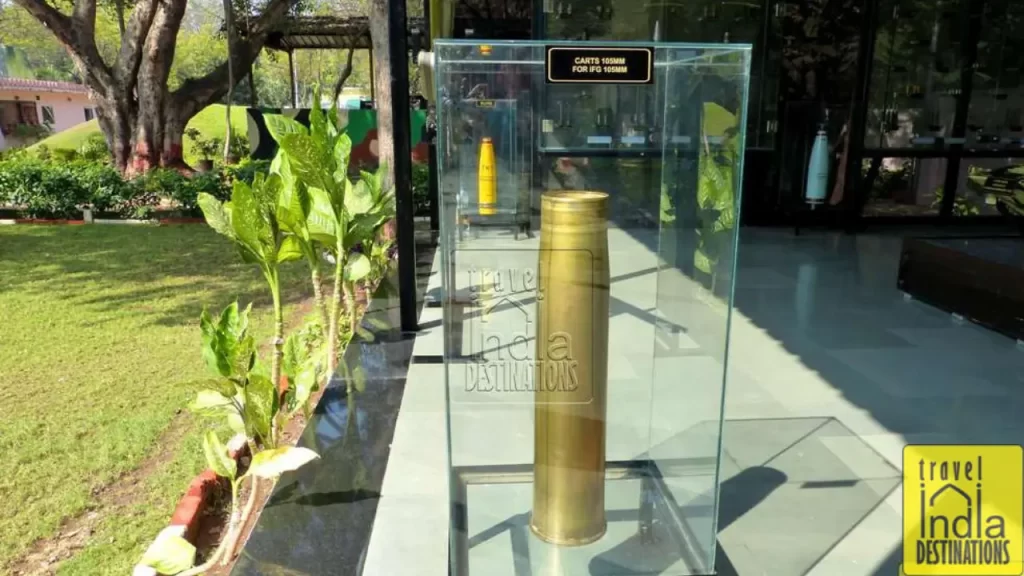
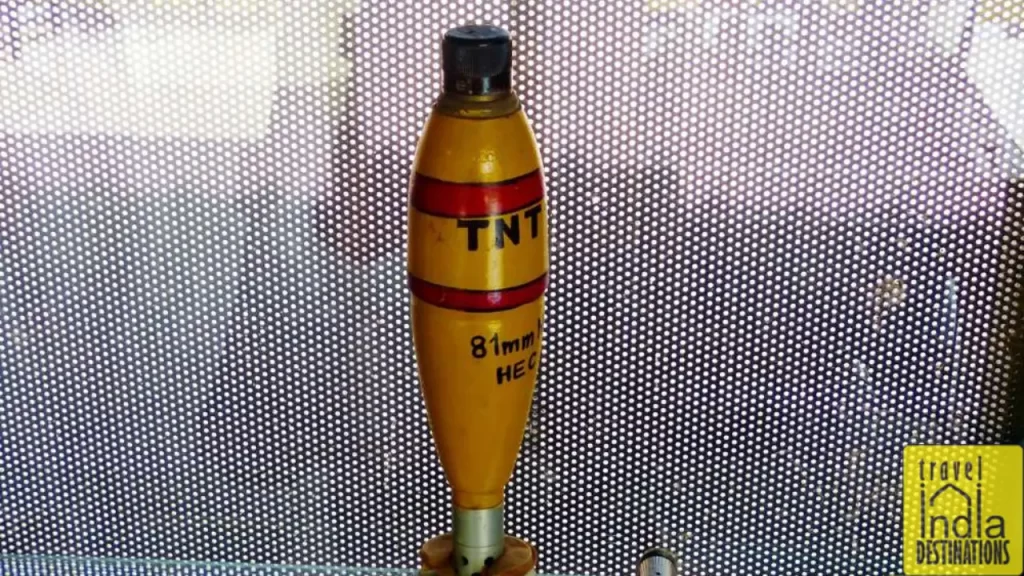
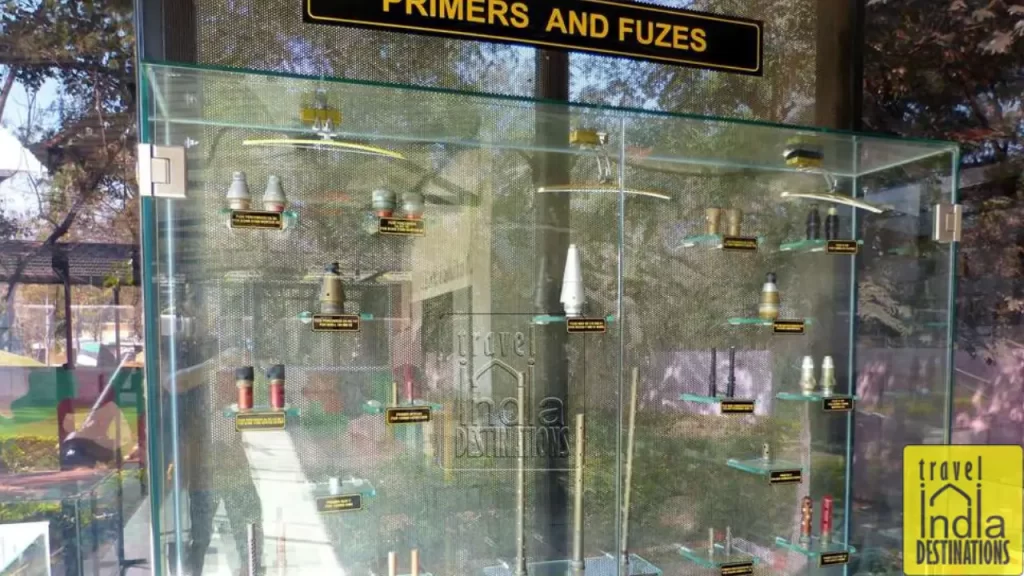
4. Paint Ball Gun Range
Towards the end of the tour is the Paint Ball Gun Range. This is where you can practice your shooting skills. This is a great way to end your tour, but you can always skip it if you do not want to try it.
For this, you need to register your name and pay Rs. 50 additionally. The personnel will provide you with 10 orange paintball pellets.
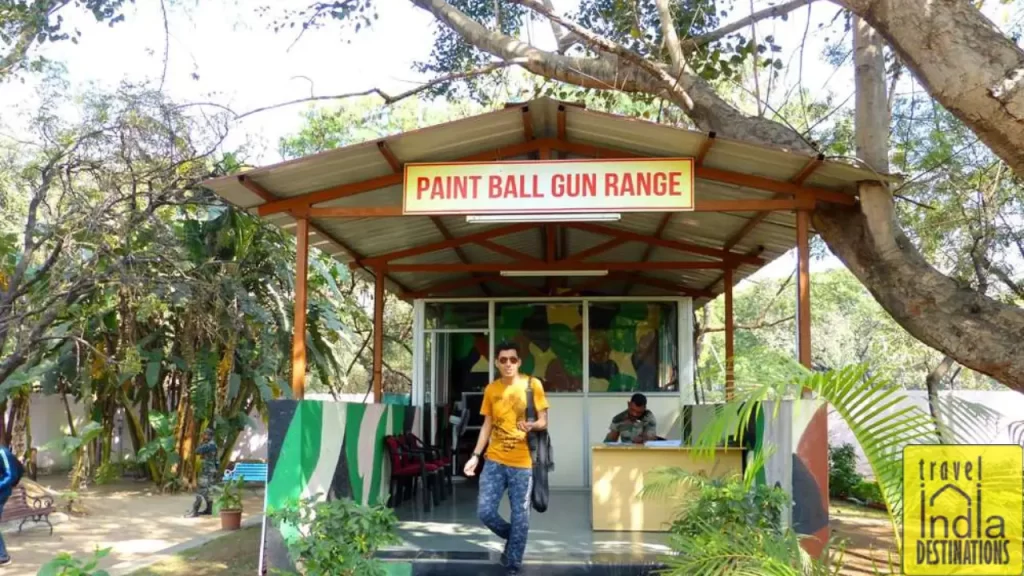
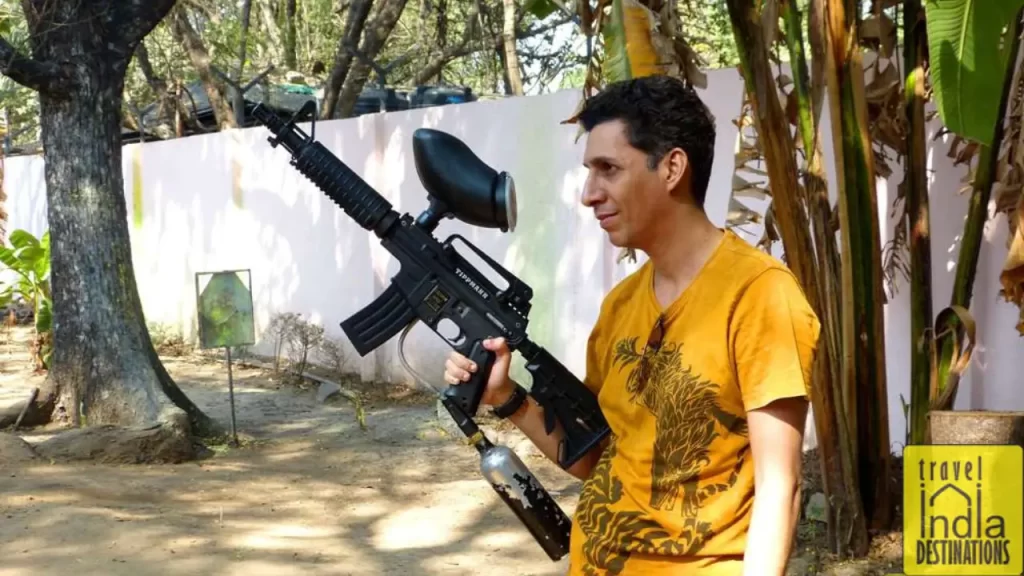
First-timers do not have to worry as guidance is available on how to handle the gun, aim and shoot. This exclusive space helps you focus and improve your shooting skills. The targets available at various levels and distances makes the experience fun and challenging.
From here, you can walk through the garden area where you will see two anti-aircraft guns. There are two mini picture galleries which you can browse in this area.
As you move further you come to the artillery section from where you began the tour. You can now either exit the premises or explore the National War Memorial area.
Conclusion
Southern Command Museum Pune is one of the most underrated army museums in India. While the premises might seem small it can take you at least two hours to cover all the galleries.
As you walk through the galleries, you feel a sense of pride in being an Indian. Every exhibit, artefact and photograph here speaks volumes about the hardships and sacrifices of the Indian Army. You also get to know unknown details about various battles and wars that are hard to put in this blog post.
Hence, if you are visiting Pune or places near Pune for 2 days or more you can add this army museum to your itinerary.
To sum it up, the Southern Command Museum is a quaint little place for history buffs, military enthusiasts and proud Indians.
Jai Hind.
10 comments
Thanks for taking us along on a wonderful tour, Sharukh. I love military museums and this appears to be a fine one. Excellent photos.
Glad that you loved it, Dan. Thank you for taking out the time to read and comment. By the way, there is a part two coming up soon.
First of all, I can’t thank you enough for highlighting this for me, Sharukh. What an amazing article, and filled with equally amazing pictures that perfectly complement the narrative. I must say, it’s a truly impressive museum. As a former Gunner in the British Royal Artillery, I particularly enjoyed and related to the opening, but equally, I read and enjoyed every word, and even leant a few things I didn’t know before relating to Indian military history. Obviously this will be of great interest to many Indians, but also to many British readers given the long and intertwined history and military, even more so given it topicality arising from the recently released ‘1917’ WW1 film.
Will certainly keep a lookout the ‘part two’ you mention in your reply to a previous comment.
Ps, although not specifically Gurkha related, I’ll be sharing this to a Gurkha fb group I’m in purely for the military interest.
Paul, to be honest, when I was at the museum taking pictures and videos, I was actually thinking of you and Dan. I know you both love military museums and this is the first one I covered for my travel website. As a history person, I just loved it. In fact, this was the best part of my recent trip. Hence, I took time to sort the best images and write it in the best way I could. The second part will be comparatively shorter but should be done this week. Also, many thanks for sharing it with your FB group. Oh, I saw the 1917 movie and it was a phenomenal experience. Not sure if you watch Indian military movies, but if you are willing to give it a try watch ‘URI’ for sure. Thank you once again for reading, commenting and sharing this post.
Nice article felt more proud about Indian heritage and the warriors who sacrificed their lives to preserve it. The gallery in the article is indispensable which encourages me more to visit the museum in Pune.
Glad you liked the post. Thank you for your comment and time, Priya.
Grate…..Very significant Information for us, I have think the representation of this Information is actually superb one.
Really detailed and impressive post. Thank you so much for info.
Hi, Sharukh. This was an unexpected topic, and added fun because of that. I enjoyed the tour. Museums are such a nice diversion on a hot humid day, regardless of anything else. Your information would be useful to anyone writing historic fiction (or nonfiction). I’ll save this as a resource, in hope of getting back to “Rose of India.” I’ve been trying to finish up all my uncompleted books (there are so many!), but going with the oldest first… so there are still several ahead of Rose. Anyhow, have a brilliant weekend. Hugs.
I try to provide as much information as I possibly can without boring the readers. For Rose of India, you always have me for background research. I know it will take time, but I would definitely love to read this one. Thanks for commenting and visiting the post, Teagan. Hugs.